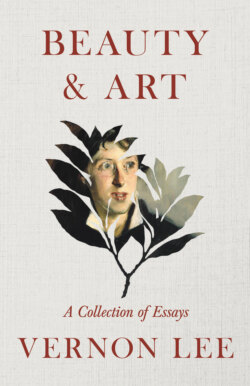Читать книгу Beauty & Art - A Collection of Essays - Vernon Lee - Страница 12
На сайте Литреса книга снята с продажи.
VI
ОглавлениеThe particular emotion produced in us by such things as are beautiful, works of art or of nature, recollections and thoughts as well as sights and sounds, the emotion of æsthetic pleasure, has been recognised ever since the beginning of time as of a mysteriously ennobling quality. All philosophers have told us that; and the religious instinct of all mankind has practically proclaimed it, by employing for the worship of the highest powers, nay, by employing for the mere designation of the godhead, beautiful sights, and sounds, and words by which beautiful sights and sounds are suggested. Nay, there has always lurked in men's minds, and expressed itself in the metaphors of men's speech, an intuition that the Beautiful is in some manner one of the primordial and, so to speak, cosmic powers of the world. The theories of various schools of mental science, and the practice of various schools of art, the practice particularly of the persons styled by themselves æsthetes and by others decadents, have indeed attempted to reduce man's relations with the great world-power Beauty to mere intellectual dilettantism or sensual superfineness. But the general intuition has not been shaken, the intuition which recognised in Beauty a superhuman, and, in that sense, a truly divine power. And now it must become evident that the methods of modern psychology, of the great new science of body and soul, are beginning to explain the reasonableness of this intuition, or, at all events, to show very plainly in what direction we must look for the explanation of it. This much can already be asserted, and can be indicated even to those least versed in recent psychological study, to wit, that the power of Beauty, the essential power therefore of art, is due to the relations of certain visible and audible forms with the chief mental and vital functions of all human beings; relations established throughout the whole process of human and, perhaps, even of animal, evolution; relations seated in the depths of our activities, but radiating upwards even like our vague, organic sense of comfort and discomfort; and permeating, even like our obscure relations with atmospheric conditions, into our highest and clearest consciousness, colouring and altering the whole groundwork of our thoughts and feelings.
Such is the primordial, and, in a sense, the cosmic power of the Beautiful; a power whose very growth, whose constantly more complex nature proclaims its necessary and beneficial action in human evolution. It is the power of making human beings live, for the moment, in a more organically vigorous and harmonious fashion, as mountain air or sea-wind makes them live; but with the difference that it is not merely the bodily, but very essentially the spiritual life, the life of thought and emotion, which is thus raised to unusual harmony and vigour. I may illustrate this matter by a very individual instance, which will bring to the memory of each of my readers the vivifying power of some beautiful sight or sound or beautiful description. I was seated working by my window, depressed by the London outlook of narrow grey sky, endless grey roofs, and rusty elm tops, when I became conscious of a certain increase of vitality, almost as if I had drunk a glass of wine, because a band somewhere outside had begun to play. After various indifferent pieces, it began a tune, by Handel or in Handel's style, of which I have never known the name, calling it for myself the Te Deum Tune. And then it seemed as if my soul, and according to the sensations, in a certain degree my body even, were caught up on those notes, and were striking out as if swimming in a great breezy sea; or as if it had put forth wings and risen into a great free space of air. And, noticing my feelings, I seemed to be conscious that those notes were being played on me, my fibres becoming the strings; so that as the notes moved and soared and swelled and radiated like stars and suns, I also, being identified with the sound, having become apparently the sound itself, must needs move and soar with them.
We can all recollect a dozen instances when architecture, music, painting, or some sudden sight of sea or mountain, have thus affected us; and all poetry, particularly all great lyric poetry, Goethe's, Shelley's, Wordsworth's, and, above all, Browning's, is full of the record of such experience.
I have said that the difference between this æsthetic heightening of our vitality (and this that I have been describing is, I pray you to observe, the æsthetic phenomenon par excellence), and such other heightening of vitality as we experience from going into fresh air and sunshine or taking fortifying food, the difference between the æsthetic and the mere physiological pleasurable excitement consists herein, that in the case of beauty, it is not merely our physical but our spiritual life which is suddenly rendered more vigorous. We do not merely breathe better and digest better, though that is no small gain, but we seem to understand better. Under the vitalising touch of the Beautiful, our consciousness seems filled with the affirmation of what life is, what is worth being, what among our many thoughts and acts and feelings are real and organic and important, what among the many possible moods is the real, eternal ourself.
Such are the great forces of Nature gathered up in what we call the æsthetic phenomenon, and it is these forces of Nature which, stolen from heaven by the man of genius or the nation of genius, and welded together in music, or architecture, in the arts of visible design or of written thoughts, give to the great work of art its power to quicken the life of our soul.
